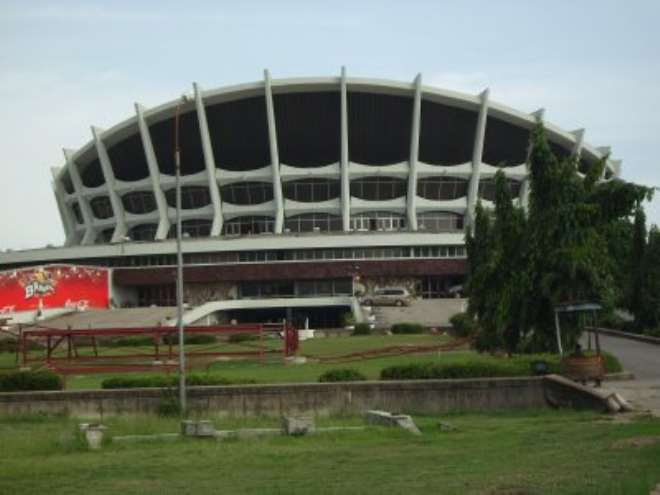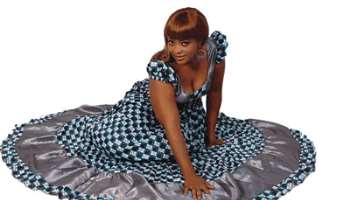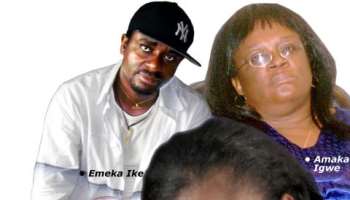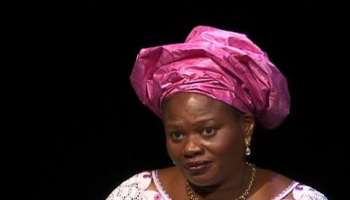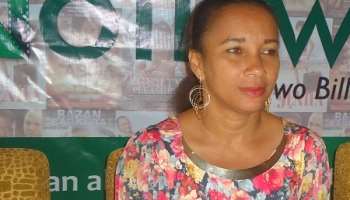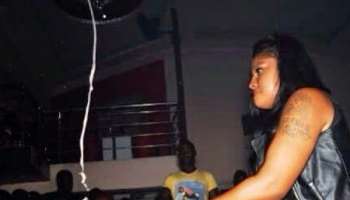National Theatre: A step forward, two steps backward
THE National Theatre situated in Iganmu, Lagos, has been in the news in the last decade, not really for its unique features - its exterior shaped like a military hat - and size, as well as the various facilities which the complex offers for diverse arts and cultural events, but for
the dip in its fortune and governments plan to sell it. Since it was established in the mid-70s, the complex has been the hub of theatre activities, art exhibitions, symposia and film shows. It has played host to various national and international theatre and musical events.
The reason for this significant role is obvious, giving the facilities it has. The National Theatre a Main hall, a conference/banquet hall, exhibition halls, two cinema halls and a VIP lounge. There is also a roof garden. The main hall is capable of seating 5,000 people, and from its inception, consists of a collapsible stage and an auditorium. When in prosce nium, the hall has a capacity for 3,500 seats.
The cinema screen in the hall is fixed at the ceiling and can be lowered by remote control. The stage has three rows of curtains, a backdrop and a double cyclorama for creating silhouette effects; and easily amenable to any directional concepts.The Conference/Banquet hall is specially designed and equipped for conferences and banquets of international standard. It has a capacity for 1,500 seats. It also has a proscenium stage, and a facility which is capable of interpreting eight languages simultaneously.
The exhibition hall is capable of of accommodating large corporate exhibitions and is equipped with lighting and sound facilities for various events and activities. The National Theatre has two Cinema halls, each with a seating capacity of 700 people. Each of the Cinema halls has standard proscenium stage facilities, and standard 16mm and 35mm film projectors with high quality sound equipment and state-of-the-art lighting facilities for stage productions.
Acknowledged as an architectural masterpiece and a cultural landmark, the complex covers an area of about 23,000 square meters and standing well over 31meters tall. The multipurpose National Theatre was established for the preservation, presentation and promotion of arts and culture in Nigeria.
Although, the idea for a National Theatre was initiated by the Gowon Administration, hosting the World Black and African Festival of Arts and Culture in 1977 (FESTAC '77) was the catalyst for the birth of the monument. The concrete arrangements for its establishment started in 1973 when the Federal Government appointed a 29-member Theatre Consultative Committee to advise on the concept and organisational structure of a theatre. The committee proposed the establishment of a National Theatre which should also be the home of a National Troupe.
The design for the monument was taken from the Palace of Culture and Sports in Varma, Bulgaria. The contract for its construction was signed on April 24, 1973, with the Bulgarian construction company called Technoexportsroy, the main contractors for the building of the complex.
But the vision for the building of the complex went beyond the provision of a befitting venue for the 2nd World Black and African Festival of Arts and Culture (FESTAC '77) which Nigeria successfully hosted in January/February, 1977, and for which the National Theatre provided more than adequate venues. The complex is to be a rallying point for artistes in Nigeria and for international artistes wishing to share their experience with their Nigerian counterparts. Even though it had been in use since late 1975, it was formally opened by the then Head of State of the Federal Republic of Nigeria, General Olusegun Obasanjo, on September 30, 1976, five months before FESTAC '77. Since then it has hosted a good number of national and international activities which include musical concerts, dramas, dances, film shows, symposia, exhibitions, conventions, workshops, among other events.
In line with the National Theatre and National Troupe of Nigeria Board Decree, No 47, of 1991, the appointment of a management team headed by a General Manager got presidential assent in October 1991, thus making the National Theatre a Government parastatal. This led to the appointment of Jimmy Atte as the first General Manager and Chief Executive of the National Theatre. The decree sought to make the National Theatre not only relevant to the development, but also the official headquaters for arts and culture in Nigeria. The magnificent building by its design and construction shows all the attributes of being the national cultural landmark of Nigeria.
However, like many national structures in Nigeria, the National Theatre has had its fare share of neglect and official mismanagement. The complex has been mired in bureaucratic bottleneck which accounts for its steady decline and dip in its fortunes. With glaring poor maintenance culture which has led to the comatose condition of many national monuments, the National Theatre began a steady crippling of its various facilities.
The the epileptic power supply gradually coming to a halt, the place became only as a last resort for events. From the late 1980s through the 90s the dip became so prominent that it became a symbol of infrastructural decay in the country. Efforts by stakeholders in the arts and culture sector to get the Federal military government at the time, to rehabilitate the monument yielded no results as successive heads of the place appear not to be interested in giving new life to the place, or have lost idea on what to do to.
In 2001, when President Olusegun Obasanjo announced plans to privatise the National Theatre, it drew the ire of stakeholders. This development sparked controversy amongst Nigerian artistes, culture activists and playwrights like Wole Soyinka, late Elder Steve Rhodes, Kolade Osinowo, Dejumo Lewis, Jide Kosoko, among others. Artistes under the aegis of their various associations and guilds like the National Association of Nigerian Theatre Arts Practitioners (NANTAP), Committee For Relevant Art(CORA), Society of Nigerian Artists (SNA), Association of Nigerian Theatre Artistes (ANTP), Guild of Nigerian Dancers (GOND), among others staged peaceful protests to stop government from carrying out its plans as it was not in the interest of the country. From what was seen as a ploy to sell the monument, it soon changed to concession.
According to the privatisation plan, by the Bureau for Public Enterprises (BPE), the National Theatre concession arrangement provides for a single concessionaire/facility manager with 20-year duration in the first instance that would pay a fixed concession fee for the entire period as well as annual rents, which is subject to review every 5 years.
The various associations and guilds also met under the aegis of Coalition of Nigerian Artist(e)s (CONA) to review the developments. According to a communique of the meeting of all members of sectoral arts bodies under the umbrella of Coalition of Nigerian Artist(e)s (CONA) and stakeholders held on Tuesday August 21, 2007 at the National Theatre, Iganmu, Lagos, the meeting while commending and re-affirming the concerted efforts of the Nigerian arts and culture sector in the protest against the concession of the National Theatre by the Bureau for Public Enterprises (BPE), adopted the approval the Coalition of Nigerian artist(e)s under the aegis of CONA with a view to creating a united front to, among other things, “In the immediate term: sustain the opposition to the concession of the National Theatre employing such media as one-minute adverts in feature films and reflection of campaigns against concession of National Theatre in body of work espoused in Nigerian films, plays and art exhibition. conceptualise, articulate and propose to the Government a feasible action plan for the resuscitation of the National Theatre and its operations under a regime of governance and management that accords with internationally-acceptable standards; and employ legal options to restate and insist of Government responsibility to the Culture Sector. On the long run: serve as a platform for the articulation of common agenda for the art and culture sector including the adoption of a National Cultural Policy, the establishment of the National Endowment for the Art; establish common fora to secure the welfare of arts and culture workers. The Meeting restates the opposition of the entire art and culture community to the transfer of the National Theatre to a private concern noting as follows:
The National Theatre is Nigeria's national cultural centre. All over the world, human communities, including nations, states, cities and other communities set up official cultural centres to: signalize the community's cultural arrival; embody its artistic values; showcase its artifacts; and incubate the progressive development of its creative expressions.
Because of the importance of the foregoing roles of a national cultural centre, national cultural centres are never: Left in the hands of public bureaucracies without specialized training and hands-on experience in facility management and the business of art and entertainment venues; nor concessioned to private entities to govern and operate.”
On the need for the resuscitation of the National Theatre, the meeting acknowledged the need for the resuscitation of the National Theatre for the fulfillment of its mandate as the Nigerian national cultural centre and the centre of arts and performances in the black world, as was conceived during the Festival of African Art and Culture (FESTAC). In this regard, the Meeting proposes the following:
That the Federal Government should review the proposed concession of the National Theatre;
a study group of stakeholders and experts should be commissioned to analyse the nature and structure of successful Public Private Participation in the operation and funding of National Cultural Centres world-wide and the appropriate legal and other frameworks for such a PPP established before inviting private participation under the framework. The framework shall define the roles and responsibility of the State, the Business Community and the Art community in the sustenance of the National Theatre.
The adopted PPP model should delineate between the management and governance of the National Theatre by handing the governance of the Theatre over to a publicly sanctioned Trust constituted by reputable artist(e)s, art connoisseurs, business men and statesmen under an enabling national legislation;
The governing trust should be empowered to define and oversee the margin of commerciality and profitability permissible in the operation of the Theatre, having regard to the need to maintain a balance between our national cultural interests and the commercial necessities of the private participation, especially in view of the funds expected to be mobilised for the resuscitation work;
Also, the governing trust, working with the management, should be empowered to mobilise funds from private endowments, corporate tax-deductible sources, and government budgetary sources, to subsidise the operations of the Theatre;
The management, of course, should be concessioned to qualified private entities with demonstrable interest in the Arts and capacity to resuscitate the Theatre.
Cooperation & Participation of the Art Community: The Meeting agrees that the Nigerian art and culture community should actively participate in the processes for the conceptualization, articulation and implementation of the appropriate model for the productive resuscitation of the National Theatre.
Enlightenment of the Art Community: The Meeting agrees that a vigorous campaign of enlightenment should be carried out within the generality of the arts and culture community with a view to clarifying the position of the Coalition under the aegis of CONA and in reinforcing the position of the Coalition as the current campaign gets underway. Such enlightenment shall be carried out through regular All-Stakeholders' meetings and through the different Sectoral groups.
These series of protests appear to have yielded results as the Federal governments seem to have put the idea on hold. A new lease of life came for the embattled edifice, with the appointment of Professor Ahmed Yerima as the General Manager. Yerima immediately began work on the rehabilitation of the monument. Within a year, all the halls, except the main hall adorned a new look, with the air conditioning systems working again.
The stinking and nauseating toilet became as clean and usable as the lobbies. Theatre activities which had since disappeared returned to the place. Like a beautiful bride, corporate bodies and agencies suddenly found the National Theatre a worthy venue for business. Under the almond trees popularly known as Abe Igi, which provides shade and meetings for artistes came alive again. It was soon branded by the Nigerian Breweries Plc. Fast Food giant, Mr Biggs opened a branch in the complex. It was not surprising also that the Nigerian Bottling Company, makers of Coca Cola soft drink, also began business there too, with their giant Coca Cola Christmas tree.
However, the mighty wind which rocked the culture sector saw the exit of Professor Yerima. He was replaced by Mallam Kabir Yusuf Yar'Ardua. The new management seemed to have begun a policy of making the complex a no-go area for theatre practitioners and indeed for art and cultural activities, as cost for the use of the hall have been put out of their reach. Organisers of the various arts and culture programmes had to look elsewhere as venues for their event. Many practitioners have begun to wonder if government, through the new management, is not about preparing the complex for concession. For several weeks the main entrance to the National Theatre, through entrance C has been closed to vehicular movements. The main hall which was said would be ready for use weeks ago is still waiting for attention. All efforts made to have an interview with the new General Manager of the National Theatre yielded no results.
As it appears, stakeholders may soon be called from the trenches to begin another series of meetings.
Latest News
-
 I Don't Like Being Sprayed With Money —- Seun Kuti
I Don't Like Being Sprayed With Money —- Seun Kuti -
 “I Wouldn't Advise Myself To Be With Someone In My
“I Wouldn't Advise Myself To Be With Someone In My -
 Nollywood Actress, Etinosa Idemudia Stands With Ph
Nollywood Actress, Etinosa Idemudia Stands With Ph -
 Bobrisky Heads To Appeal Court, Challenges Six-mon
Bobrisky Heads To Appeal Court, Challenges Six-mon -
 “Sometimes, The Answers To Your Problems Lies In Y
“Sometimes, The Answers To Your Problems Lies In Y -
 “Man Of The Year" - Pretty Mike Crowns Portable
“Man Of The Year" - Pretty Mike Crowns Portable -
 Yingi Debuts "Waterside Girl EP"; A Melodic Journe
Yingi Debuts "Waterside Girl EP"; A Melodic Journe -
 Singer, Joeboy Reveals Criteria For Men To Know Tr
Singer, Joeboy Reveals Criteria For Men To Know Tr -
 “I Wish I Had Found Love Before Now– Spyro
“I Wish I Had Found Love Before Now– Spyro -
 Toyin Abraham Appreciates Funke Akindele, Barring
Toyin Abraham Appreciates Funke Akindele, Barring


